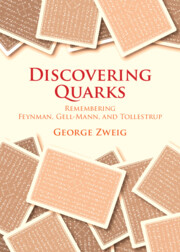Book contents
- Frontmatter
- Dedication
- Frontmatter
- Contents
- Preface
- 1 The Road to Quarks
- 2 The Discovery of Quarks
- 3 Alvin Virgil Tollestrup
- 4 Richard Phillips Feynman
- 5 Murray Gell-Mann
- 6 A Deeper Layer of Reality
- 7 Epilogue
- A A Primer on Quarks
- B The First CERN Report
- Glossary: A Guide for the Perplexed
- Acknowledgments
- Further Reading
- Bibliography
- Index
4 - Richard Phillips Feynman
Published online by Cambridge University Press: 06 November 2025
- Frontmatter
- Dedication
- Frontmatter
- Contents
- Preface
- 1 The Road to Quarks
- 2 The Discovery of Quarks
- 3 Alvin Virgil Tollestrup
- 4 Richard Phillips Feynman
- 5 Murray Gell-Mann
- 6 A Deeper Layer of Reality
- 7 Epilogue
- A A Primer on Quarks
- B The First CERN Report
- Glossary: A Guide for the Perplexed
- Acknowledgments
- Further Reading
- Bibliography
- Index
Summary
Chapter 4 on Richard Feynman, my theoretical physics thesis advisor, is a collection of vignettes that reveal aspects of behavior and thought that contributed to his mystique and unique accomplishments in physics.
After relating the history behind Feynman’s V-A theory of party violation, much of it in Feynman’s own words, the rest of the chapter is based on my personal interactions with Feynman lasting for a little more than twenty years, from the time I arrived at Caltech in 1959 till I left in 1981. Feynman’s attitude towards experimental results related to parity violation provides an informative background to how he would handle experimental information related to the discovery of quarks. The intent here, and in the remainder of the Chapter, is to give the reader a sense of how Feynman thought about physics, how he practiced it, and what he valued. His struggle with constituent quarks (aces), and what to make of them, lasted considerably longer than a decade, passing though several phases, including one with partons, but eventually ending with his fully accepting their reality.
Information
- Type
- Chapter
- Information
- Discovering QuarksRemembering Feynman, Gell-Mann, and Tollestrup, pp. 40 - 65Publisher: Cambridge University PressPrint publication year: 2025
Accessibility standard: Inaccessible, or known limited accessibility
Why this information is here
This section outlines the accessibility features of this content - including support for screen readers, full keyboard navigation and high-contrast display options. This may not be relevant for you.Accessibility Information
Content Navigation
Allows you to navigate directly to chapters, sections, or non‐text items through a linked table of contents, reducing the need for extensive scrolling.
Provides an interactive index, letting you go straight to where a term or subject appears in the text without manual searching.
